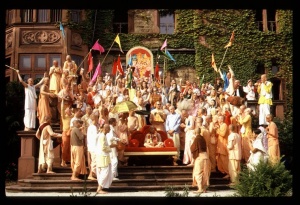SB 10.82.3-6: Difference between revisions
(Vanibot #0018 edit: make synonym terms in Sanskrit italic in SB - Vanisource) |
(Vanibot #0054 edit - transform synonyms into clickable links, which search similar occurrences) |
||
| Line 40: | Line 40: | ||
<div class="synonyms"> | <div class="synonyms"> | ||
''niḥkṣatriyām'' | ''[//vanipedia.org/wiki/Special:VaniSearch?s=niḥkṣatriyām&tab=syno_o&ds=1 niḥkṣatriyām]'' — rid of kings; ''[//vanipedia.org/wiki/Special:VaniSearch?s=mahīm&tab=syno_o&ds=1 mahīm]'' — the earth; ''[//vanipedia.org/wiki/Special:VaniSearch?s=kurvan&tab=syno_o&ds=1 kurvan]'' — having made; ''[//vanipedia.org/wiki/Special:VaniSearch?s=rāmaḥ&tab=syno_o&ds=1 rāmaḥ]'' — Lord Paraśurāma; ''[//vanipedia.org/wiki/Special:VaniSearch?s=śastra&tab=syno_o&ds=1 śastra]'' — of weapons; ''[//vanipedia.org/wiki/Special:VaniSearch?s=bhṛtām&tab=syno_o&ds=1 bhṛtām]'' — of the holders; ''[//vanipedia.org/wiki/Special:VaniSearch?s=varaḥ&tab=syno_o&ds=1 varaḥ]'' — the greatest; ''[//vanipedia.org/wiki/Special:VaniSearch?s=nṛpāṇām&tab=syno_o&ds=1 nṛpāṇām]'' — of kings; ''[//vanipedia.org/wiki/Special:VaniSearch?s=rudhira&tab=syno_o&ds=1 rudhira]'' — of the blood; ''[//vanipedia.org/wiki/Special:VaniSearch?s=oghena&tab=syno_o&ds=1 oghena]'' — with the floods; ''[//vanipedia.org/wiki/Special:VaniSearch?s=yatra&tab=syno_o&ds=1 yatra]'' — where; ''[//vanipedia.org/wiki/Special:VaniSearch?s=cakre&tab=syno_o&ds=1 cakre]'' — he made; ''[//vanipedia.org/wiki/Special:VaniSearch?s=mahā&tab=syno_o&ds=1 mahā]'' — great; ''[//vanipedia.org/wiki/Special:VaniSearch?s=hradān&tab=syno_o&ds=1 hradān]'' — lakes; ''[//vanipedia.org/wiki/Special:VaniSearch?s=īje&tab=syno_o&ds=1 īje]'' — worshiped; ''[//vanipedia.org/wiki/Special:VaniSearch?s=ca&tab=syno_o&ds=1 ca]'' — and; ''[//vanipedia.org/wiki/Special:VaniSearch?s=bhagavān&tab=syno_o&ds=1 bhagavān]'' — the Supreme Lord; ''[//vanipedia.org/wiki/Special:VaniSearch?s=rāmaḥ&tab=syno_o&ds=1 rāmaḥ]'' — Paraśurāma; ''[//vanipedia.org/wiki/Special:VaniSearch?s=yatra&tab=syno_o&ds=1 yatra]'' — where; ''[//vanipedia.org/wiki/Special:VaniSearch?s=aspṛṣṭaḥ&tab=syno_o&ds=1 aspṛṣṭaḥ]'' — untouched; ''[//vanipedia.org/wiki/Special:VaniSearch?s=api&tab=syno_o&ds=1 api]'' — even though; ''[//vanipedia.org/wiki/Special:VaniSearch?s=karmaṇā&tab=syno_o&ds=1 karmaṇā]'' — by material work and its reactions; ''[//vanipedia.org/wiki/Special:VaniSearch?s=lokam&tab=syno_o&ds=1 lokam]'' — the world in general; ''[//vanipedia.org/wiki/Special:VaniSearch?s=saṅgrāhayan&tab=syno_o&ds=1 saṅgrāhayan]'' — instructing; ''[//vanipedia.org/wiki/Special:VaniSearch?s=īśaḥ&tab=syno_o&ds=1 īśaḥ]'' — the Lord; ''[//vanipedia.org/wiki/Special:VaniSearch?s=yathā&tab=syno_o&ds=1 yathā]'' — as if; ''[//vanipedia.org/wiki/Special:VaniSearch?s=anyaḥ&tab=syno_o&ds=1 anyaḥ]'' — another person; ''[//vanipedia.org/wiki/Special:VaniSearch?s=agha&tab=syno_o&ds=1 agha]'' — sins; ''[//vanipedia.org/wiki/Special:VaniSearch?s=apanuttaye&tab=syno_o&ds=1 apanuttaye]'' — in order to dispel; ''[//vanipedia.org/wiki/Special:VaniSearch?s=mahatyām&tab=syno_o&ds=1 mahatyām]'' — mighty; ''[//vanipedia.org/wiki/Special:VaniSearch?s=tīrtha&tab=syno_o&ds=1 tīrtha]-[//vanipedia.org/wiki/Special:VaniSearch?s=yātrāyām&tab=syno_o&ds=1 yātrāyām]'' — on the occasion of the holy pilgrimage; ''[//vanipedia.org/wiki/Special:VaniSearch?s=tatra&tab=syno_o&ds=1 tatra]'' — there; ''[//vanipedia.org/wiki/Special:VaniSearch?s=bhāratīḥ&tab=syno_o&ds=1 bhāratīḥ]'' — of Bhārata-varṣa; ''[//vanipedia.org/wiki/Special:VaniSearch?s=prajāḥ&tab=syno_o&ds=1 prajāḥ]'' — people; ''[//vanipedia.org/wiki/Special:VaniSearch?s=vṛṣṇayaḥ&tab=syno_o&ds=1 vṛṣṇayaḥ]'' — members of the Vṛṣṇi clan; ''[//vanipedia.org/wiki/Special:VaniSearch?s=ca&tab=syno_o&ds=1 ca]'' — and; ''[//vanipedia.org/wiki/Special:VaniSearch?s=tathā&tab=syno_o&ds=1 tathā]'' — also; ''[//vanipedia.org/wiki/Special:VaniSearch?s=akrūra&tab=syno_o&ds=1 akrūra]-[//vanipedia.org/wiki/Special:VaniSearch?s=vasudeva&tab=syno_o&ds=1 vasudeva]-[//vanipedia.org/wiki/Special:VaniSearch?s=āhuka&tab=syno_o&ds=1 āhuka]-[//vanipedia.org/wiki/Special:VaniSearch?s=ādayaḥ&tab=syno_o&ds=1 ādayaḥ]'' — Akrūra, Vasudeva, Āhuka (Ugrasena) and others; ''[//vanipedia.org/wiki/Special:VaniSearch?s=yayuḥ&tab=syno_o&ds=1 yayuḥ]'' — went; ''[//vanipedia.org/wiki/Special:VaniSearch?s=bhārata&tab=syno_o&ds=1 bhārata]'' — O descendant of Bharata (Parīkṣit); ''[//vanipedia.org/wiki/Special:VaniSearch?s=tat&tab=syno_o&ds=1 tat]'' — that; ''[//vanipedia.org/wiki/Special:VaniSearch?s=kṣetram&tab=syno_o&ds=1 kṣetram]'' — to the holy place; ''[//vanipedia.org/wiki/Special:VaniSearch?s=svam&tab=syno_o&ds=1 svam]'' — their own; ''[//vanipedia.org/wiki/Special:VaniSearch?s=agham&tab=syno_o&ds=1 agham]'' — sins; ''[//vanipedia.org/wiki/Special:VaniSearch?s=kṣapayiṣṇavaḥ&tab=syno_o&ds=1 kṣapayiṣṇavaḥ]'' — desirous of eradicating; ''[//vanipedia.org/wiki/Special:VaniSearch?s=gada&tab=syno_o&ds=1 gada]-[//vanipedia.org/wiki/Special:VaniSearch?s=pradyumna&tab=syno_o&ds=1 pradyumna]-[//vanipedia.org/wiki/Special:VaniSearch?s=sāmba&tab=syno_o&ds=1 sāmba]-[//vanipedia.org/wiki/Special:VaniSearch?s=ādayaḥ&tab=syno_o&ds=1 ādayaḥ]'' — Gada, Pradyumna, Sāmba and others; ''[//vanipedia.org/wiki/Special:VaniSearch?s=sucandra&tab=syno_o&ds=1 sucandra]-[//vanipedia.org/wiki/Special:VaniSearch?s=śuka&tab=syno_o&ds=1 śuka]-[//vanipedia.org/wiki/Special:VaniSearch?s=sāraṇaiḥ&tab=syno_o&ds=1 sāraṇaiḥ]'' — with Sucandra, Śuka and Sāraṇa; ''[//vanipedia.org/wiki/Special:VaniSearch?s=āste&tab=syno_o&ds=1 āste]'' — remained; ''[//vanipedia.org/wiki/Special:VaniSearch?s=aniruddhaḥ&tab=syno_o&ds=1 aniruddhaḥ]'' — Aniruddha; ''[//vanipedia.org/wiki/Special:VaniSearch?s=rakṣāyām&tab=syno_o&ds=1 rakṣāyām]'' — for guarding; ''[//vanipedia.org/wiki/Special:VaniSearch?s=kṛtavarmā&tab=syno_o&ds=1 kṛtavarmā]'' — Kṛtavarmā; ''[//vanipedia.org/wiki/Special:VaniSearch?s=ca&tab=syno_o&ds=1 ca]'' — and; ''[//vanipedia.org/wiki/Special:VaniSearch?s=yūtha&tab=syno_o&ds=1 yūtha]-[//vanipedia.org/wiki/Special:VaniSearch?s=paḥ&tab=syno_o&ds=1 paḥ]'' — leader of the army. | ||
</div> | </div> | ||
Latest revision as of 20:03, 17 February 2024

A.C. Bhaktivedanta Swami Prabhupada
Please note: The synonyms, translation and purport of this verse were composed by disciples of Śrīla Prabhupāda
TEXTS 3-6
- niḥkṣatriyāṁ mahīṁ kurvan
- rāmaḥ śastra-bhṛtāṁ varaḥ
- nṛpāṇāṁ rudhiraugheṇa
- yatra cakre mahā-hradān
- īje ca bhagavān rāmo
- yatrāspṛṣṭo 'pi karmaṇā
- lokaṁ saṅgrāhayann īśo
- yathānyo 'ghāpanuttaye
- mahatyāṁ tīrtha-yātrāyāṁ
- tatrāgan bhāratīḥ prajāḥ
- vṛṣṇayaś ca tathākrūra-
- vasudevāhukādayaḥ
- yayur bhārata tat kṣetraṁ
- svam aghaṁ kṣapayiṣṇavaḥ
- gada-pradyumna-sāmbādyāḥ
- sucandra-śuka-sāraṇaiḥ
- āste 'niruddho rakṣāyāṁ
- kṛtavarmā ca yūtha-paḥ
SYNONYMS
niḥkṣatriyām — rid of kings; mahīm — the earth; kurvan — having made; rāmaḥ — Lord Paraśurāma; śastra — of weapons; bhṛtām — of the holders; varaḥ — the greatest; nṛpāṇām — of kings; rudhira — of the blood; oghena — with the floods; yatra — where; cakre — he made; mahā — great; hradān — lakes; īje — worshiped; ca — and; bhagavān — the Supreme Lord; rāmaḥ — Paraśurāma; yatra — where; aspṛṣṭaḥ — untouched; api — even though; karmaṇā — by material work and its reactions; lokam — the world in general; saṅgrāhayan — instructing; īśaḥ — the Lord; yathā — as if; anyaḥ — another person; agha — sins; apanuttaye — in order to dispel; mahatyām — mighty; tīrtha-yātrāyām — on the occasion of the holy pilgrimage; tatra — there; bhāratīḥ — of Bhārata-varṣa; prajāḥ — people; vṛṣṇayaḥ — members of the Vṛṣṇi clan; ca — and; tathā — also; akrūra-vasudeva-āhuka-ādayaḥ — Akrūra, Vasudeva, Āhuka (Ugrasena) and others; yayuḥ — went; bhārata — O descendant of Bharata (Parīkṣit); tat — that; kṣetram — to the holy place; svam — their own; agham — sins; kṣapayiṣṇavaḥ — desirous of eradicating; gada-pradyumna-sāmba-ādayaḥ — Gada, Pradyumna, Sāmba and others; sucandra-śuka-sāraṇaiḥ — with Sucandra, Śuka and Sāraṇa; āste — remained; aniruddhaḥ — Aniruddha; rakṣāyām — for guarding; kṛtavarmā — Kṛtavarmā; ca — and; yūtha-paḥ — leader of the army.
Translation and purport composed by disciples of Śrīla Prabhupāda
TRANSLATION
After ridding the earth of kings, Lord Paraśurāma, the foremost of warriors, created huge lakes from the kings' blood at Samantaka-pañcaka. Although he is never tainted by karmic reactions, Lord Paraśurāma performed sacrifices there to instruct people in general; thus he acted like an ordinary person trying to free himself of sins. From all parts of Bhārata-varṣa a great number of people now came to that Samanta-pañcaka on pilgrimage. O descendant of Bharata, among those arriving at the holy place were many Vṛṣṇis, such as Gada, Pradyumna and Sāmba, hoping to be relieved of their sins; Akrūra, Vasudeva, Āhuka and other kings also went there. Aniruddha remained in Dvārakā with Sucandra, Śuka and Sāraṇa to guard the city, together with Kṛtavarmā, the commander of their armed forces.
PURPORT
According to Śrīla Viśvanātha Cakravartī, Śrī Kṛṣṇa's grandson Aniruddha remained in Dvārakā to protect the city because He is originally Lord Viṣṇu's manifestation as the guardian of the spiritual planet Śvetadvīpa.